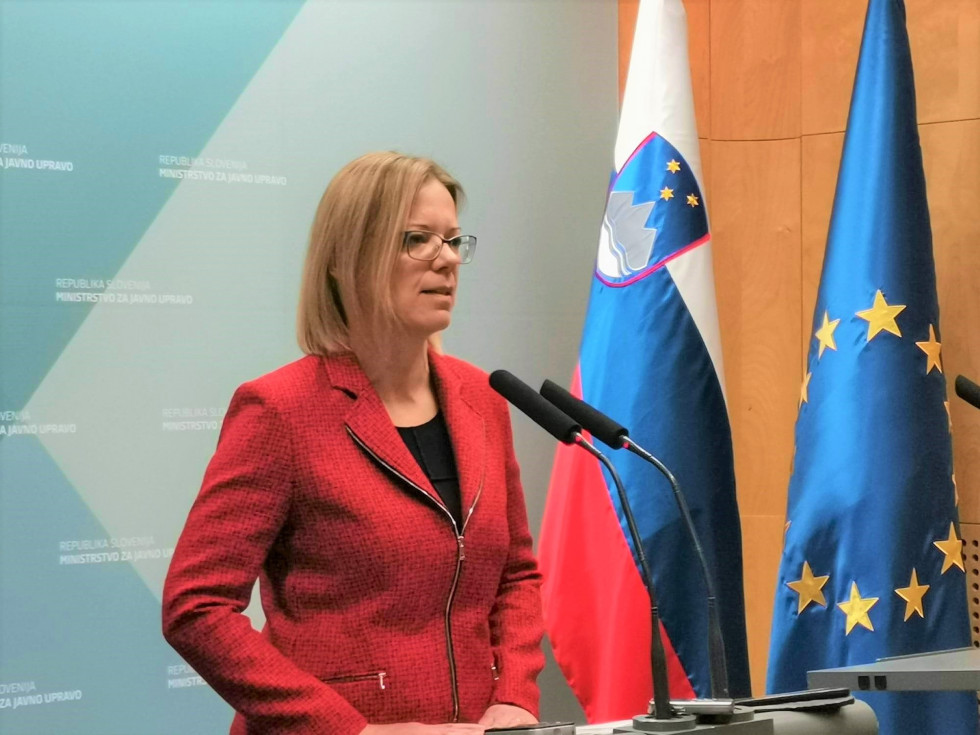Government and trade unions have committed to seek maximum consensus

Minister of Public Administration Sanja Ajanović Hovnik | Author Ministry of Public Administration
As the Minister said, the first step will be to start negotiations on the elimination of disparities, which follows the positions we set with the agreement signed in October, i.e. that the reform of the salary system will consist of two parts. “The first part is to address all positions below the minimum salary, which means establishing a new salary scale, and the second part is to eliminate the disparities resulting from partial interventions in the salary system in the past.”
Negotiating positions with the representative public sector trade unions on the reform of the salary system and the elimination of disparities in the basic salaries follow the positions and analyses presented in previous months and published on the Ministry’s website. The positions adopted by the Government last week also set out a clear timetable, the Minister stressed.
Government adopts negotiating positions with representative public sector trade unions on the reform of the salary system and the elimination of disparities in the basic salaries
Last week, the Government of the Republic of Slovenia mandated a government negotiating team at its meeting to negotiate with the representative public sector trade unions on the reform of the salary system and the elimination of disparities in the basic salaries, taking into account the agreed positions.
It also instructed the government’s negotiating team to take the following guidelines into account in its negotiations with the representative public sector trade unions:
- the scope of the negotiations, in addition to the reform of the salary system and the elimination of disparities in the basic salaries, shall also include parallel negotiations on the reform of titles, the reform of allowances, including allowances outside the range of allowances provided for in Article 23 of the Public Sector Salary System Act and the Collective Agreement for Public Sector, the determination of the conditions and number of days of annual leave, and the reform of occupational insurance;
- solutions on the elimination of disparities in the basic salaries shall be agreed upon by 30 June 2023, with entitlement to a salary arising from the elimination of disparities by 31 December 2024, taking into account the public finance framework;
- a proposal for a new law on the common foundations of the public sector salary system with a new salary scale shall be tabled in the legislative procedure no later than July 2023, with a view to its entry into force generally on 1 January 2024; as a general rule, the starting salary grades of positions and titles in the bottom third of the salary scale shall be translated into the new salary scale as of 1 January 2025, the other salary grades of positions and titles as of 1 January 2026 and the salary grades of functions as of 1 January 2027, taking into account the public finance framework;
- regular performance-related bonuses shall be frozen as of 1 January 2024;
- negotiations on the reform of the public sector salary system and the elimination of disparities shall be considered together with negotiations on the other subjects listed in point 1; no single subject can be implemented until all subjects have been agreed.
To eliminate the disparities in the basic salaries, the Minister of Public Administration, as head of the government negotiating team, appointed a special inter-ministerial working group, taking into account the proposals for the appointment of members from the ministries and the Secretariat-General of the Government. Based on the positions, it will prepare the Government’s proposal for a definite classification of certain positions and titles in salary grades, which will then be negotiated with the representative public sector trade unions.
According to the positions for the reform of the public sector salary system presented at the negotiating committee meeting on 9 February 2023, basic salary disparities would be eliminated within the salary pillars and taking into account the range of minimum and maximum starting salary grades by salary rate bracket.
In October 2022, the government and the trade unions committed themselves in point 6 of the Agreement on Measures in the Field of Salaries and Other Labour Costs in the Public Sector for 2022 and 2023 that negotiations or coordination will run in parallel both on the reform of the public sector salary system and on the elimination of disparities in the basic salaries of public employees.
The objectives of the reform of the public sector salary system include:
- maintaining transparency and public financial control of the salary system,
- taking into account the specifics of the individual parts of the public sector and allowing for the possibility to regulate certain content separately under individual pillars of the salary system,
- eliminating the equalisation at the lower end of the salary scale due to the impact of the minimum salary and establishing more appropriate salary ratios between officials, directors and public employees and within the pillars,
- ensuring greater variability linked to work efficiency,
- making the system more attractive to young people,
- ensuring less administration and a more simplified system.
By reforming the salary system, the government aims to tackle the growing equalisation of salaries, ensure that salaries are incentivised, address the growing difficulties in recruiting staff, especially young people, and make the salary system attractive and rewarding for all – for employees and, as a result, for users of public services.
The government will present its positions to the trade unions at a meeting of the negotiating committee next week.

